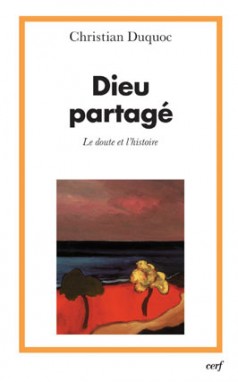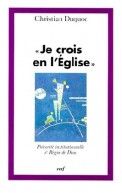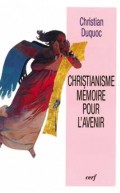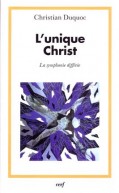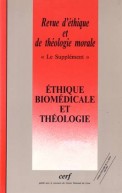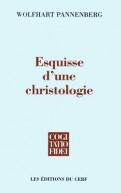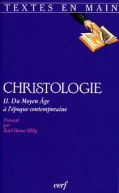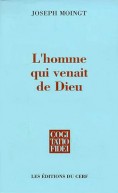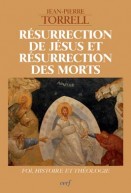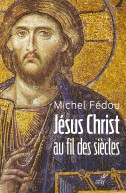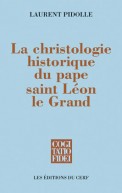Dieu partagé
Collection Théologies
320 pages - avril 2006
38,50€
« Le Dieu d'Abraham, d'Isaac et de Jacob, non le Dieu des philosophes. » Cet aphorisme de Pascal pointe vers la dualité de l'alliance : l'une contractée par Dieu avec Israël, l'autre initiée avec Noé. La première fut particulière, elle bénéficia d'une parole et d'une promesse sans cesse renouvelées. La seconde s'épuisa dès son origine dans une garantie de sécurité cosmique et l'interdiction de verser le sang. Dieu se taisant, elle ne reçut pas de paroles divines spécifiques, elle laissa le champ libre à la quête humaine, religieuse ou philosophique, du divin. Mille tentatives furent entreprises pour l'arraisonner. Ce chemin tracé et retracé depuis la nuit des temps demeure encore parcouru par des multitudes. La voie initiée en Israël et développée par Jésus s'en démarque fortement : elle s'appuie sur un contrat contesté qui, lors de conflits récurrents entre l'un et l'autre partenaires, dévoile l'être humain en son ambiguïté et révèle Dieu en sa patience et ses hésitations. Impliqué dans une histoire mouvementée, Dieu semble « partag頻 sur la conduite à tenir : ou se réfugier dans sa transcendance, ou se rendre vulnérable. Un titre biblique exprime son acceptation de la contradiction, celui de « serviteur ». Ce titre est la clé d'une connaissance de Dieu qui se sépare de l'épopée religieuse et philosophique à visages multiples ouverte par l'alliance noachique. Cette aventure sans soutien divin déclaré oppose un contre-pouvoir à la révélation particulière qui tend à l'universel, elle la préserve d'annexer prématurément la totalité du domaine humain et de se figer en une pensée unifiée.
--
“The God of Abraham, Isaac and Jacob, not the God of philosophers.” Pascal’s aphorism points to the duality of the alliance: one contracted by God with Israel, the other initiated with Noah. The former was specific; it benefited from a word and a promise constantly renewed. The second was drained at the outset, with a guarantee of cosmic security and the prohibition of spilling blood. God remaining silent, no specific divine words being received, the door was left open to human, religious and philosophical quests for the divine. A thousand attempts were made. The path, drawn and redrawn since the beginning of time, is still frequented by the multitudes. The way initiated in Israel and developed by Jesus is very different: it is based on a contract that, during the frequent conflicts between partners, reveals the human being in all his ambiguity and God’s patience and hesitations. Implicated in an eventful history, God seems to be “divided” about what to do: to take refuge in transcendence, or accept vulnerability. One biblical term expresses his acceptation of that contradiction: that of “servant”. This definition is the key to a knowledge of God that breaks away from the multi-facetted religious and philosophical epic set in motion by the alliance with Noah. This adventure, without proclaimed divine support, opposes a counter-power to a specific revelation that tends toward the universal; it prevents it from prematurely annexing the totality of the human domain and becoming frozen in unified thought.
--
“The God of Abraham, Isaac and Jacob, not the God of philosophers.” Pascal’s aphorism points to the duality of the alliance: one contracted by God with Israel, the other initiated with Noah. The former was specific; it benefited from a word and a promise constantly renewed. The second was drained at the outset, with a guarantee of cosmic security and the prohibition of spilling blood. God remaining silent, no specific divine words being received, the door was left open to human, religious and philosophical quests for the divine. A thousand attempts were made. The path, drawn and redrawn since the beginning of time, is still frequented by the multitudes. The way initiated in Israel and developed by Jesus is very different: it is based on a contract that, during the frequent conflicts between partners, reveals the human being in all his ambiguity and God’s patience and hesitations. Implicated in an eventful history, God seems to be “divided” about what to do: to take refuge in transcendence, or accept vulnerability. One biblical term expresses his acceptation of that contradiction: that of “servant”. This definition is the key to a knowledge of God that breaks away from the multi-facetted religious and philosophical epic set in motion by the alliance with Noah. This adventure, without proclaimed divine support, opposes a counter-power to a specific revelation that tends toward the universal; it prevents it from prematurely annexing the totality of the human domain and becoming frozen in unified thought.
- Dimensions : 145x235x20
- ISBN : 9782204080743
- Poids : 484 grammes
DU MÊME AUTEUR
> VOIR TOUS LES LIVRES DE l'AUTEUR
DANS LA CATÉGORIE THÈMES DOCTRINAUX
La Christologie historique du pape saint Léon le Grand - CF 290
de Laurent Pidolle
400 pages - oct. 2013

